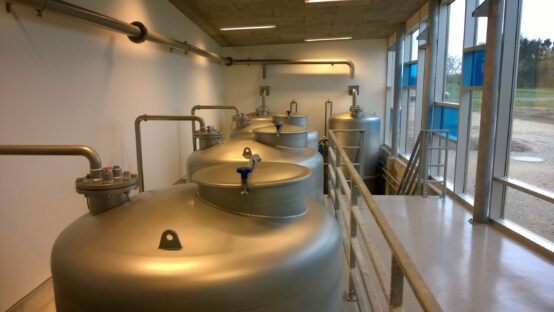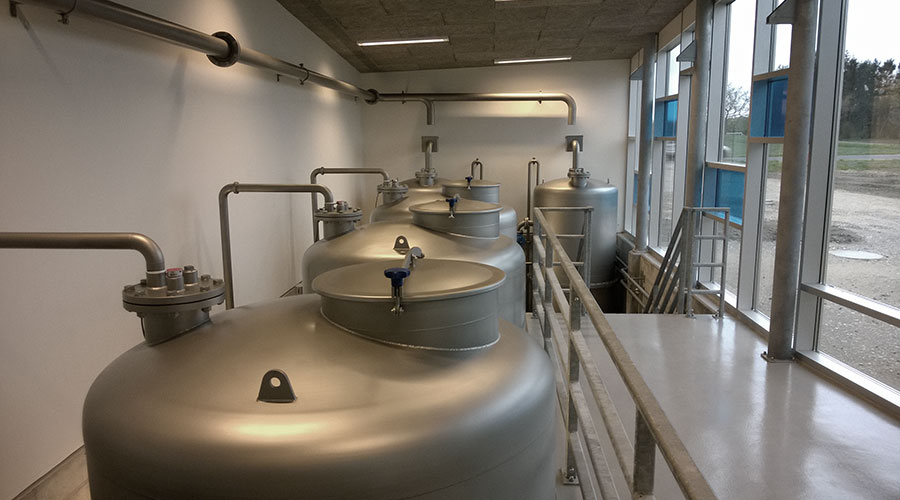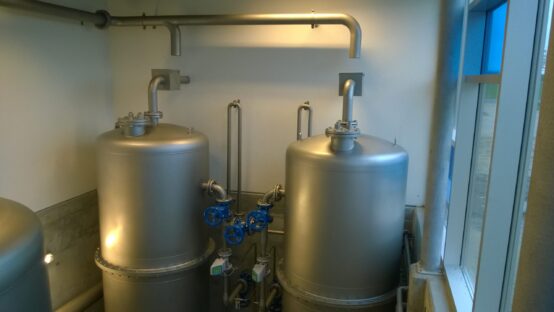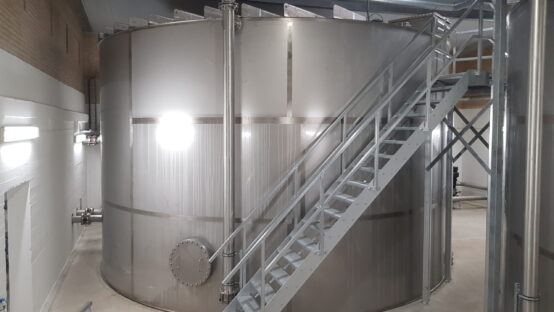
JH Stålindustri provides many kinds of tanks for those working in the water treatment industry. For instance, we manufacture filter tanks, oxygenation tanks, clean water tanks and softening columns. Furthermore, we have built contiguous plants of big buffer tanks that can manage large reserves or water. As a result, we are confident in taking on all tasks related to stainless-steel and can cover both the need of big and small water management companies
Stainless-Steel Filter Tanks
When the water is pumped out of the ground and filled into raw water tanks, it can both smell and taste bad. This is because the water has collected hydrogen sulfide which needs to be filtered out. This is when a filter tank is used. Filter tanks contains sand and gravel which have function together to filter the iron and magnesium oxides out of the ground water that it has brought with it when it was pumped.
Today many of Denmark’s 3000 waterworks are using filter tanks made of galvanized or painted steel. However, many foresee a future where the waterworks industry will have to meet higher standards than those that are already in place. When that time comes, it will be necessary to use stainless-steel filter tanks.
Stainless-Steel Clear Water Tanks
Clean water tanks used in waterworks are often made from different materials. The premium choice is a stainless-steel tank from JH Stålindustri. This is because your waterworks will get a future-proof solution with many advantages compared to the traditional clean water tanks in concrete under the ground.
The advantages of choosing a stainless-steel tank from JH Stålindustri is among others:
- Minimizing of risk of bacteria formation
- Maintenance-free
- No sedimentation
Stainless-steel clean water tanks are typically placed indoors. Since the tanks can be quite large, it can be difficult to transport them. Thankfully, our certified welders also have extensive experience with assembling them on location.
Softening columns: Let JH Stålindustri Improve the Water Quality
many parts of Denmark our drinking water is hard or rich in lime. For each individual household this means that lime gets stuck on pipes and in household instruments such as water fixtures, and dishwashing machines. Taps are thus blocked by the lime and the water does not taste as clean as it should. Also, washing clothes will not result in soft clothing. Waterworks in areas with hard water are thus beginning to plan a softening of the water, and some waterworks have already established this with the help of softening columns.
Softening columns (also known as pelletreaktor) can be implemented in waterworks. With softening columns from JH Stålindustri, the lime, iron and magnesium content are removed from the water before it reaches the filter tanks. The softening columns also ensure that the rest of the process is not strained which will reduce the maintenance of other tanks on the plant.
Research made by The Danish Technical University in cooperation with HOFOR A/S shows that softening columns reduce iron and magnesium concentrations by 89-99%, and thus the coating on the following tanks will contain little iron and manganese.
JH Stålindustri has many years of experience with stainless steel tanks for waterworks
At JH Stålindustri we have more than 30 years of experience manufacturing products. We also have plenty of experience specifically related to waterworks, so when you choose us you will get a top-quality product and a business partner who understands the needs of the industry.
At JH Stålindustri we manufacture stainless-steel tanks to meet the requirements for specifications of our customers. We highly value that all the standards are met, and that our customers receive a tank of highest quality. That is why our customers can expect:
- That we make sure we are 100% aware of the customer’s needs and requirements for the tank
- A constant effort is made to make sure the customer understands all the technical details about the tanks. We may provide 3d diagrams to give a visual cue.
- Documentation for the manufacturing of the tanks. Among this material will be welding certificates, surface checks, pressure checks, drain tests and much more.



